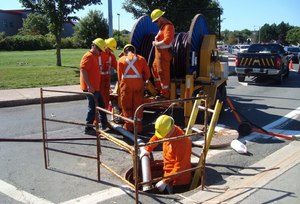
About 1/3 of the water utilities workforce is eligible to retire in the next decade. EPA and U.S. Army Corp of Engineers will establish a workforce development grant for the sector.
SAN FRANCISCO — Mayor London Breed, the San Francisco Public Utilities Commission (SFPUC) and its partners announced the establishment of a federal grant program to fund training and career development for the water utilities workforce.
The water and wastewater industries offer good jobs that can provide long-term stability for workers and their families, and this grant funding will help train and develop a diverse array of prospective employees to enter into those fields,” said San Francisco Mayor London N. Breed.
More than 30 percent of the nation’s water and wastewater workers are eligible to retire in the next five to 10 years, making this grant program a vital opportunity to train the next generation of industry employees.
Included in the America’s Water Infrastructure Act, the $1 million per year competitive grant program was championed by the SFPUC and its partner utilities in the Water Agency Leaders Alliance (WALA), the National League of Cities (NLC) and the National Association of Clean Water Agencies (NACWA), among other national organizations.
The original legislation was sponsored by U.S. Senators Cory Booker of New Jersey and Shelley Moore Capito of West Virginia. The bill authorizes the U.S. Environmental Protection Agency and the United States Army Corps to establish the competitive water utilities workforce development grant, according to Booker’s website.
An influx of infrastructure work is projected to generate $524 billion in economic activity and create nearly 300,000 job opportunities across the country. The competitive grant program will help train workers to build and repair important water systems throughout the country, while providing pathways to careers with competitive wages and benefits.
At the SFPUC, nearly 50 percent of our employees are eligible to retire in the next 5 – 10 years,” said SFPUC General Manager Harlan L. Kelly, Jr. “We must act now to ensure that we are prepared to replenish our workforce ranks and that we do so with employees who reflect the diversity of our communities.
The SFPUC offers career development and workforce training programs opportunities for local residents through initiatives like the Sewer System Improvement Program (SSIP) Cityworks, Project Pull and the Jobs Training and Opportunities Program (JTOP).
Other city water utilities are also enthusiastic:
“For every $1 million invested in water infrastructure improvements, there is a direct, indirect and induced impact of 15.5 jobs,” said Commissioner Kishia L. Powell, city of Atlanta Department of Watershed Management.
“This will make such a huge impact in our water industry and the communities we serve, both rural and urban communities. Water utilities need replacement workers and we are often located in communities where people need jobs. The new water workforce bill will help provide the resources so that our neighbors who need jobs can get the necessary training to become the replacement workers that water utilities need. It is a true win-win for everyone,” said Andrew Kricun, executive director and chief engineer of the Camden County Municipal Utilities Authority.
Utility agencies from both rural and urban communities will be eligible to apply for the grant funding, which can be used for a variety of job training and workforce development programs.
Many of the careers in the water and wastewater industries have low-educational barriers to entry, and the openings are often permanent, civil service positions. When paired with strong community partnerships and intentional strategies to address barriers to employment for hard-to-serve communities, these training programs can help reduce income inequality and address the shrinking middle class, according to the SFPUC announcement.
“We strongly supported this legislation and its inclusion in the 2018 WRDA package,” said Adam Krantz, chief executive officer of the National Association of Clean Water Agencies (NACWA). “Clean water agencies provide quality jobs in every state which are vital to protecting local water quality and public health. Yet developing the next generation of skilled workers is a significant challenge that utilities are facing head-on. This new grant program will help address the challenge while facilitating development of new approaches and best practices to addressing the water workforce pipeline.”
The partner agencies in WALA advised on a recent study from the Brookings Institution that found workers in the water industry tended to be older and lacked racial and gender diversity in certain areas. The report recommended new strategies at the local, regional, state and national level to attract younger and more diverse employees.
The competitive grant program — the first of its kind for the water industry — can help achieve those goals.
“Cities across the country are facing a severe shortage of skilled workers to operate our nation’s water systems,” said Clarence E. Anthony, CEO and executive director of the National League of Cities. “At the same time, there is a looming workforce challenge to build new water infrastructure systems that meet the needs of the 21st century…Investments such as these equip cities with the tools to develop the next generation of workers and provide clean and safe water to American communities, which is essential to driving our nation’s economy forward.”
Over the next decade, the country’s 30 largest water utilities are estimated to spend $23 billion on water infrastructure projects, according to the Water Environment Research Foundation.
“As the Louisville Metropolitan Sewer District embarks on a $4.3 billion Critical Repair & Reinvestment Plan (CRRP), we recognize the need for a qualified and skilled workforce to meet our infrastructure challenges,” said Louisville MSD Executive Director Tony Parrott. “In Louisville alone, the economic impact will be $5 billion and 3,700 jobs per year over the next 20 years in sustaining the CRRP. This new grant will ensure the funding is available for Louisville MSD to collaborate with workforce development agencies, technical schools and others to get employees in the diverse neighborhoods we serve the training and skills needed for our industry.”
Copyright © 2024 GovGrantsHelp.com. All rights reserved.
